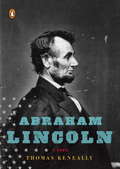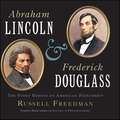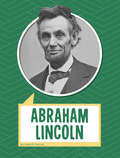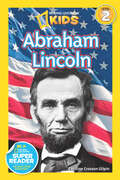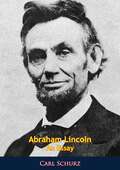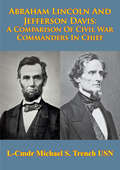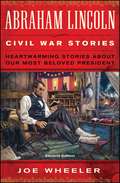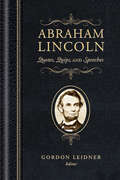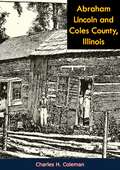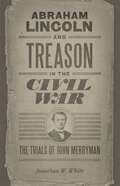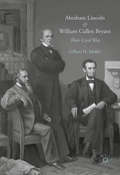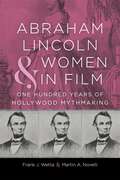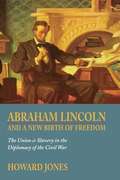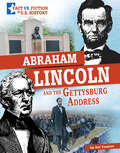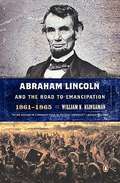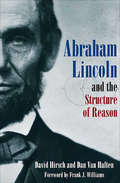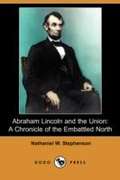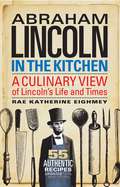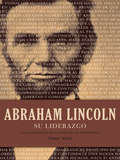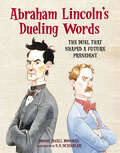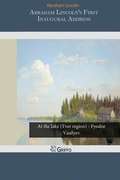- Table View
- List View
Abraham Lincoln
by Balu SathyaThis book is a biography of former American President Abraham Lincoln.
Abraham Lincoln
by James Russell LowellWhen Lincoln took office as President of the United States, the nation was fraught with problems, not the least of which was slavery and the danger of secession. This biography relates how Lincoln dealt with the problems with thought and wisdom.
Abraham Lincoln
by Terence BallAbraham Lincoln occupies a unique place in the American pantheon. Symbol, sage, myth and martyr, he is an American icon - Honest Abe and The Great Emancipator, a Janus-faced demigod sculpted in marble. But this is the post-assassination Lincoln. During his lifetime Lincoln elicited very different reactions. The writings and speeches presented in this scholarly edition illuminate Lincoln as a political thinker in the context of his own time and political situation. Opening with a concise yet rich introduction, the texts that follow are complete and carefully edited, with extensive annotation and footnotes to provide a clearer insight into Lincoln the man, the politician and political thinker. His views on race and slavery, on secession and civil war and on the contradiction (as his saw it) between the Declaration of Independence ('all men are created equal') and the original Constitution (which condones slavery) are laid out in Lincoln's own well-crafted words.
Abraham Lincoln
by Thomas KeneallyThe ideal concise biography of an American icon- now available in paperback for the bicentennial of his birth<P><P> The self -made man from a log cabin, the great orator, the Emancipator, the Savior of the Union, the martyr-Lincoln's story is at the very heart of American history. But who was he, really? In this outstanding biography, award-winning author Thomas Keneally follows Lincoln from his impoverished birth through his education and presidency. From the development of his political philosophy to his troubled family life and his actions during the Civil War, Abraham Lincoln is an incisive study of a turning point in our history and a revealing portrait of a pivotal figure.
Abraham Lincoln & Frederick Douglass: The Story Behind an American Friendship
by Russell FreedmanFrom the author of Lincoln: A Photobiography, comes a clear-sighted, carefully researched account of two surprisingly parallel lives and how they intersected at a critical moment in U.S. history. Abraham Lincoln and Frederick Douglass were both self-taught, both great readers and believers in the importance of literacy, both men born poor who by their own efforts reached positions of power and prominence—Lincoln as president of the United States and Douglass as the most famous and influential African American of his time. Though their meetings were few and brief, their exchange of ideas helped to end the Civil War, reunite the nation, and abolish slavery. Includes bibliography, source notes, and index.
Abraham Lincoln (Biographies)
by Laura K. MurrayHow much do you know about Abraham Lincoln? Find out the facts you need to know about the 16th president of the United States. You'll learn about the early life, challenges, and major accomplishments of this important American.
Abraham Lincoln (Readers Bios)
by Caroline Crosson GilpinThe most effective method used to influence children to read is to incorporate the information that interests them the most. National Geographic Readers are educational, high-interest, and comprehensive for children. In this title, readers will learn about the fascinating life and legacy of our 16th President of the United States, Abraham Lincoln and his historic decision to abolish slavery. Readers will also learn why this decision impacted the United States, as well as the extent of Lincoln's impact as a fearless leader of the Civil War. In this level two biography, difficult concepts are made understandable and transitioned into a more approachable manner. This includes the use of sidebars, timetables, diagrams and fun facts to hold the interest of the young reader. The colorful design and educational illustrations round out this text as an exemplary book for their young minds to explore. National Geographic supports K-12 educators with ELA Common Core Resources.Visit www.natgeoed.org/commoncore for more information.
Abraham Lincoln An Essay: An Essay
by Carl SchurzAbraham Lincoln “An Essay" from Carl Schurz. Confidante of Lincoln, U.S. Ambassador to Spain, a major-general in the Civil War, a U.S. Senator from Missouri, Secretary of the Interior in the Hayes administration, author of a biography of Henry Clay, president of the National Civil Service Reform League, and an editorial writer for Harper's Weekly (1829-1906) – Print ed.
Abraham Lincoln And Jefferson Davis: A Comparison Of Civil War Commanders In Chief
by L-Cmdr Michael S. TrenchThis is a study of the effectiveness of Abraham Lincoln and Jefferson Davis as Commanders in Chief during the Civil War. It begins by comparing their backgrounds prior to assuming the Presidency; then comparing their military strategies and command structures. The final area of comparison is their involvement in the first military draft in American history. Davis had extensive government and military experience, but exhibited personality traits early on that later hampered his performance as a war-time Commander in Chief. Lincoln had very little experience, but excelled at dealing with people. Lincoln tried several staff arrangements before finally appointing Grant as General in Chief. Davis changed his structure very little throughout the war. Although he appointed Lee as General in Chief in the first year, he lost his services by placing him in command of a field army. Both faced strong challenges from a powerful governor over the draft. Davis first tried to win over the governor, then appealed directly to the people. Lincoln publicly kept distant from the draft and worked behind the scenes.
Abraham Lincoln Civil War Stories
by Joe WheelerThis historic heirloom treasury is filled with heartwarming stories about our nation's most beloved president--Abraham Lincoln.Of the countless books about our beloved President Lincoln, few--if any--contain such a rare collection of stories as this unique volume does, especially about the Civil War days. Gathered over a lifetime from old magazines and publications, most published between the 1880s and 1950s, these stories tell of the personal life of Lincoln and the impact he had on the people who met him. Children and adults alike will be thrilled with these heartwarming stories of this great but humble man. This is the perfect book to read together as a family and a wonderful way to create a new family tradition. Visually enhanced by photographs, as well as rare etchings that Joe Wheeler has assembled throughout his research, Abraham Lincoln War Stories offers an intimate look into the servant heart of President Lincoln, his dedication to the men who served him, and his homespun humor and wisdom.
Abraham Lincoln Quotes, Quips, and Speeches
by Abraham Lincoln Gordon LeidnerMore than 140 years since his death, the enduring legacy of a great president, an American success story, and the celebrated leader of the Civil War continues. Abraham Lincoln: Quotes, Quips, and Speechescaptures the essence of the sixteenth president. In addition to Lincoln's own words, Gordon Leidner includes insights into the man by those who knew him best, from his wife, Mary Todd Lincoln, to his greatest political opponent, Stephen A. Douglas. Numerous photographs add to the charm and usefulness of the book.
Abraham Lincoln and Coles County, Illinois
by Charles H. ColemanIn the predawn darkness of Friday, February 1, 1861, aboard a westbound train, Abraham Lincoln, left Coles County for the last time.Elected to the presidency the previous November and not yet having departed his home in Springfield for Washington, D.C., to be inaugurated, he had come on January 30 to visit his stepmother, Sarah Bush Lincoln, and to say farewell to friends and family in Charleston and the surrounding area.He would never return. Having led the United States through the Civil War, he would die at the hand of assassin John Wilkes Booth in Washington’s Ford Theater on another Friday—April 14, 1865.This book by history scholar Charles H. Coleman explores Lincoln’s close-knit family ties in and connection to Coles County, located in east-central Illinois: the home of his father and stepmother, Thomas and Sarah Bush Lincoln, as well as his stepbrother John and his stepsisters, Sarah Elizabeth and Matilda, along with their families, and where Lincoln himself was a frequent visitor during his lifetime.
Abraham Lincoln and Treason in the Civil War: The Trials of John Merryman (Conflicting Worlds: New Dimensions of the American Civil War)
by Jonathan W. WhiteIn the spring of 1861, Union military authorities arrested Maryland farmer John Merryman on charges of treason against the United States for burning railroad bridges around Baltimore in an effort to prevent northern soldiers from reaching the capital. From his prison cell at Fort McHenry, Merryman petitioned Chief Justice of the Supreme Court Roger B. Taney for release through a writ of habeas corpus. Taney issued the writ, but President Abraham Lincoln ignored it. In mid-July Merryman was released, only to be indicted for treason in a Baltimore federal court. His case, however, never went to trial and federal prosecutors finally dismissed it in 1867.In Abraham Lincoln and Treason in the Civil War, Jonathan White reveals how the arrest and prosecution of this little-known Baltimore farmer had a lasting impact on the Lincoln administration and Congress as they struggled to develop policies to deal with both northern traitors and southern rebels. His work exposes several perennially controversial legal and constitutional issues in American history, including the nature and extent of presidential war powers, the development of national policies for dealing with disloyalty and treason, and the protection of civil liberties in wartime.
Abraham Lincoln and William Cullen Bryant: Their Civil War
by Gilbert H. MullerThis definitive dual portrait offers a fresh perspective on Abraham Lincoln and William Cullen Bryant's crucial role in elevating him to the presidency. The book also sheds new light on the influence that "Bryant and his class" (as Lincoln called the Radical Republican faction whose views Bryant articulated) wielded on the chief executive. How the cautious president and the preeminent editor of the Fourth Estate interacted--and how their ideological battle tilted gradually in Bryant's favor--is the centerpiece of this study. A work of meticulous scholarship and a model of compression, Lincoln and Bryant is a watershed account of two Republicans fighting common enemies (and each other) during the Civil War era.
Abraham Lincoln and Women in Film: One Hundred Years of Hollywood Mythmaking (Conflicting Worlds: New Dimensions of the American Civil War)
by Frank J. Wetta Martin A. NovelliFrank J. Wetta and Martin A. Novelli’s Abraham Lincoln and Women in Film investigates how depictions of women in Hollywood motion pictures helped forge the myth of Lincoln. Exploring female characters’ backstories, the political and cultural climate in which the films appeared, and the contest between the moviemakers’ imaginations and the varieties of historical truth, Wetta and Novelli place the women in Lincoln’s life at the center of the study, including his mother, Nancy Hanks Lincoln; his stepmother, Sarah Bush Lincoln; his lost loves, Ann Rutledge and Mary Owens; and his wife and widow, Mary Todd Lincoln. Later, while inspecting Lincoln’s legacy, they focus on the 1930s child actor Shirley Temple and the 1950s movie star Marilyn Monroe, who had a well-publicized fascination with the sixteenth president. Wetta and Novelli’s work is the first to deal extensively with the women in Lincoln’s life, both those who interacted with him personally and those appearing on screen. It is also among the first works to examine how scholarly and popular biography influenced depictions of Lincoln, especially in film.
Abraham Lincoln and a New Birth of Freedom
by Howard JonesIn Abraham Lincoln and a New Birth of Freedom, Howard Jones explores the relationship between President Lincoln's wartime diplomacy and his interrelated goals of forming a more perfect Union and abolishing slavery. From the outset of the Civil War, Lincoln's central purpose was to save the Union by defeating the South on the battlefield. No less important was his need to prevent a European intervention that would have facilitated the South's move for independence. Lincoln's goal of preserving the Union, however, soon evolved into an effort to form a more perfect Union, one that rested on the natural rights principles of the Declaration of Independence and thus necessitated emancipation.Howard Jones is University Research Professor in the Department of History at the University of Alabama. He is the author of numerous books, including Mutiny on the Amistad: The Saga of a Slave Revolt and Its Impact on American Abolition, Law, and Diplomacy which provided the historical basis for the movie Amistad.
Abraham Lincoln and the Gettysburg Address: Separating Fact from Fiction (Fact vs. Fiction in U.S. History)
by Nel YomtovIn 1863, Abraham Lincoln gave a speech in Gettysburg, Pennsylvania. Since then, the famous speech has led to many stories about it—but not all of them are true. Discover what’s real and what’s fiction through expertly leveled text containing primary sources.
Abraham Lincoln and the Road to Emancipation, 1861-1865
by William K. KlingamanIn this comprehensive account of Abraham Lincoln's Emancipation Proclamation, William K. Klingaman takes a fresh look at what is arguably the most controversial reform in American history. Taking the reader from Lincoln's inauguration through the Civil War to his tragic assassination, it uncovers the complex political and psychological pressures facing Lincoln in his consideration of the slavery question, including his decision to issue the proclamation without consulting any member of his cabinet, and his meticulous attention to every word of the document. The book concludes with a discussion of what the Emancipation Proclamation really meant to four million newly freed blacks and its subsequent impact on race relations in America.
Abraham Lincoln and the Structure of Reason
by Frank J. Williams David Hirsch Dan Van HaftenThe secrets of one of history’s greatest orators are revealed in “one of the most stunningly original works on Abraham Lincoln to appear in years” ( John Stauffer, Professor of English and History, Harvard University). For more than 150 years, historians have speculated about what made Abraham Lincoln truly great. How did Lincoln create his compelling arguments, his convincing oratory, and his unforgettable writing? Some point to Lincoln’s study of grammar, literature, and poetry. Others believe it was the deep national crisis that gave import to his words. Most agree that he honed his persuasive technique in his work as an Illinois attorney. Here, the authors argue that it was Lincoln’s in-depth study of geometry that made the president’s verbal structure so effective. In fact, as the authors demonstrate, Lincoln embedded the ancient structure of geometric proof into the Gettysburg Address, the Cooper Union speech, the first and second inaugurals, his legal practice, and much of his substantive post-1853 communication. Also included are Lincoln’s preparatory notes and drafts of some of his most famous speeches as well as his revisions and personal thoughts on public speaking and grammar. With in-depth research and provocative insight, Abraham Lincoln and the Structure of Reason “offers a whole new angle on Lincoln’s brilliance” (James M. Cornelius, Curator, Lincoln Collection, Abraham Lincoln Presidential Library and Museum).
Abraham Lincoln for Kids: His Life and Times with 21 Activities
by Janis HerbertProviding a fresh perspective on one of the most beloved presidents of all time, this illuminating activity book tells the rich story of Abraham Lincoln's life and details the events of his era. Highlighting Lincoln's warm, generous spirit and impressive intellect, the guide teaches children about his fascinating life story, his struggles at the onset of the Civil War, and his relevance in today's world. Activities include delivering a speech, holding a debate, drawing political cartoons, and making a stovepipe hat or miniature Mississippi River flatboat. Lively sidebars, abundant photographs and illustrations, and fun projects help to kick the dust off old Honest Abe. Also included are selections from some of Lincoln's most famous speeches and documents, as well as a resource section of Web sites to explore and sites to visit, making this a comprehensive Lincoln biography for young readers.
Abraham Lincoln in the Kitchen: A Culinary View of Lincoln's Life and Times
by Rae Katherine EighmeyAbraham Lincoln in the Kitchen is a culinary biography unlike any before. The very assertion of the title--that Abraham Lincoln cooked--is fascinating and true. It's an insight into the everyday life of one of our nation's favorite and most esteemed presidents and a way to experience flavors and textures of the past. Eighmey solves riddles such as what type of barbecue could be served to thousands at political rallies when paper plates and napkins didn't exist, and what gingerbread recipe could have been Lincoln's childhood favorite when few families owned cookie cutters and he could carry the cookies in his pocket. Through Eighmey's eyes and culinary research and experiments--including sleuthing for Lincoln's grocery bills in Springfield ledgers and turning a backyard grill into a cast-iron stove--the foods that Lincoln enjoyed, cooked, or served are translated into modern recipes so that authentic meals and foods of 1820-1865 are possible for home cooks. Feel free to pull up a chair to Lincoln's table.
Abraham Lincoln su liderazgo
by César VidalNo hay otra figura presidencial que domine el campo internacional como Abraham Lincoln.La figura de Lincoln se yergue con tintes extraordinarios no sólo sobre la historia de Estados Unidos, sino sobre la universal. De manera bien significativa, el aspecto de la personalidad de Lincoln que ha sido peor tratado tanto en obras de ficción como de no-ficción es el espiritual. Lincoln fue un hombre de fe, que oraba habitualmente, que leía y conocía la Biblia en profundidad y que buscaba la dirección de Dios para su vida. Este libro del gran historiador César Vidal es una exposición de los acontecimientos más relevantes de la existencia de Lincoln, la guerra entre los Estados, la Proclama de Emancipación y sus desdichas familiares, mostrando cómo se vieron impregnados de manera decisiva por su fe. Vidal se detiene de manera especial en sus discursos y escritos y en los testimonios de personas que vivieron a su lado y que dieron fe de lo que Lincoln hacía.
Abraham Lincoln's Dueling Words: The Duel that Shaped a Future President
by Donna Janell BowmanAbraham Lincoln was known for his sense of humor. But early in his adult life, it got him into trouble. He had to use his imagination to save his career—and maybe even his life. When Abraham Lincoln became frustrated with the actions of James Shield, a political rival, he came up with a plan. It was silly. It was clever. And it was a great big mistake! Lincoln wrote a series of fictional letters to the editor, complaining about Shields. But when Shields took offense, he challenged Lincoln to a duel. How did our future president straighten things out and save the lives and careers of both himself and his rival?Donna Bowman's humorous voice and S. D. Schindler's expressive illustrations are the perfect match for this story of Abraham Lincoln's humor and wit. Back matter includes an author's note and bibliography.
Abraham Lincoln's First Inaugural Address
by Abraham LincolnIt must have been a tense day as the newly elected President Lincoln stood to declare his first inaugural address. As Lincoln looked over the crowed in what was southern Washington D.C. he must have seen the tension, palpable and thick in the air. The controversy over this Northern elected president sparked the civil war, the very thing he tried to prevent in his address. "[. . . ] That there are persons in one section or another who seek to destroy the Union at all events, and are glad of any pretext to do it, I will neither affirm nor deny; but if there be such, I need address no word to them. To those, however, who really love the Union may I not speak? Before entering upon so grave a matter as the destruction of our national fabric, with all its benefits, its memories, and its hopes, would it not be wise to ascertain precisely why we do it? Will you hazard so desperate a step while there is any possibility that any portion of the ills you fly from have no real existence? Will you, while the certain ills you fly to are greater than all the real ones you fly from-will you risk the commission of so fearful a mistake? All profess to be content in the Union if all Constitutional rights can be maintained. Is it true, then, that any right, plainly written in the Constitution, has been denied? I think not. Happily the human mind is so constituted that no party can reach to the audacity of doing this. Think, if you can, of a single instance in which a plainly written provision of the Constitution has ever been denied. If by the mere force of numbers a majority should deprive a minority of any clearly written Constitutional right, it might, in a moral point of view, justify revolution-certainly would if such a right were a vital one. But such is not our[. . . ]".

